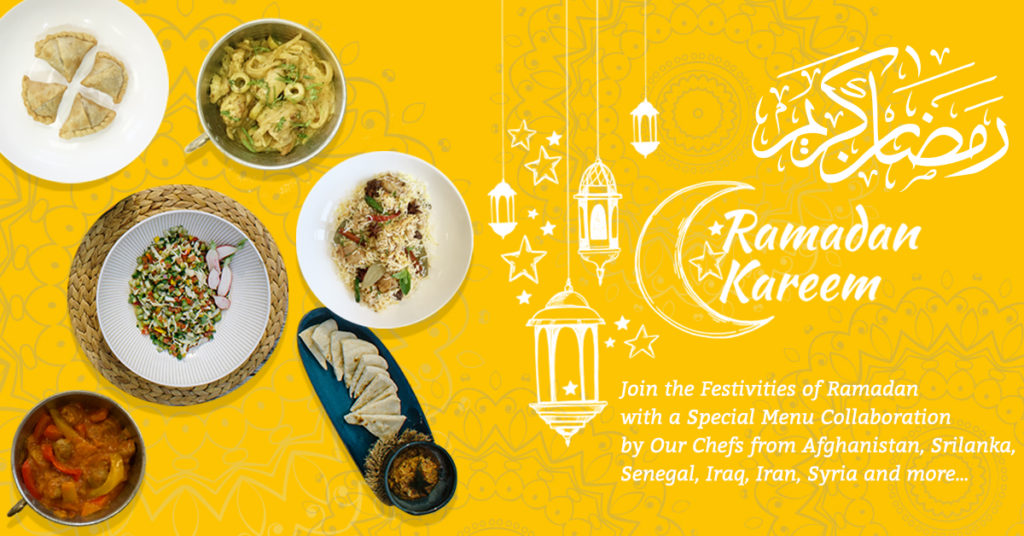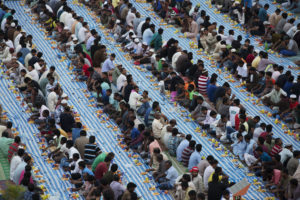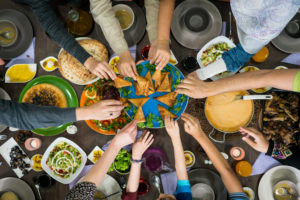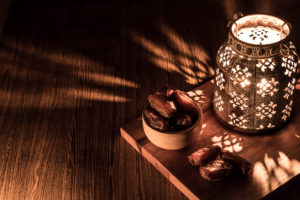Ramadan Brings Communities Together on One Large Food Table

Disclaimer: The views and opinions expressed in this article are those of the author and do not necessarily reflect the official policy or position of Eat Offbeat
Written by Ahmed Zidan, Egyptian Journalist and Social Media Strategist – Tweets @zidanism
The smell of edible delicacies fill the nostrils, the sound of utensils banging on tables in harmony arising from the neighbors’ windows. The sun is just about to set, and everyone is on standby. Then the sound of madfa’ (cannon) coming from the 800-year old Cairo Citadel, built by the Kurdish Ayyubid ruler Saladin, culminates the anticipation.
The ceremonial blank shot, followed by adhan (call to prayer) and du’a (invocation), announces a synchronized feast in which tens of millions of Egyptian Muslims will simultaneously indulge in the ritual of eating. This is not a large national dinner, but rather a normal Ramadan evening.
Ramadan is the ninth month of the Islamic calendar and is observed by the over 1.8 billion Muslims worldwide in Muslim countries and in the diaspora. It is a month of sawm (fasting) to commemorate the first revelation of the Quran to Muhammad, the founder of Islam, in Laylato al-Qadr (Night of Power) over 1,400 years ago, according to the Islamic belief.
During the 29 or 30 days of Ramadan, Muslims abstain from food, drink, smoking and sex daily from sunrise to sunset. Observants believe that fasting helps develop good behavior, purify body and soul, attain taqwa (fear of God), and induce jihado an-nafs, an Islamic concept of consciously repelling against one’s own psyche with all of its desires and temptations.
In addition to reading the Quran, either individually or in groups, believers practice zakat (that which purifies), which is calculated based on one’s wealth and properties, from each according to his ability, to each according to his needs (think of zakat as taxation but without the IRS forms), and sadaqa (alms giving).

Muslims show compassion toward the poor during that month, including but not limited to, organizing khaimat iftar (tents for breaking the fast), that provide free meals for those in need at iftar time, usually donated by wealthy individuals, mosques and institutions. Fasting is a Fardhu ‘ain (obligatory) for adult Muslims, with a few exceptions.
In his book, “Loud Thoughts on Religion: A Version of the System Study of Religion. Useful Lessons for Everybody,” the Azerbaijani academic Rafig Aliyev states that pagans of Mecca, where Muhammad is said to be born, also fasted, but only on the tenth day of Muharram, Ashura, to expiate sins and avoid droughts. “In Islam, of course, there are promised, compensated and expiatory fasting, although fasting during the month of Ramadan is completely different,” Aliyev writes. “[F]asting is performed as a gratitude to Allah for welfare [Muslims] are given.”
Scholars argue that Ramadan fasting originated from the strict Lenten discipline of the Syrian Churches. Jews and Bahá’ís, also monotheists, fast in a similar fashion but for a fewer number of days annually. There are also various forms of fasting in both Buddhism and Hinduism.
Some observants believe in health benefits associated with fasting, although this is widely disputed in the scientific community.
As Islam was tailored for the Arabian Peninsula, where it had originated [Muslims, to the contrary, believe in the universality of their religion], observant communities in the northernmost regions, like Chechnya, the Scandinavian Peninsula, and elsewhere, will find themselves fasting anywhere between 17 to 20 hours a day this year. Watch this beautiful video, created by my former colleagues at Radio Netherlands Worldwide, on how Muslims of Iceland observe Ramadan.
Muslim communities across New York and New Jersey will come together to celebrate the month of Ramadan, especially in the areas of Bay Ridge (Yemenis, Egyptians and Palestinians), Midwood (Uzbeks,Tajiks, and other Central Asian Muslims), Kensington (Pakistanis and Bengalis), Cobble Hill’s section of Atlantic Avenue (Yemenis and Syrians), Astoria’s Little Egypt in and around Steinway Street, Jersey City (Egyptians), Clifton, NJ, and others.

Despite the fact that there are currently two Muslim American women serving in Congress for the first time, Ramadan comes again this year in a politically charged atmosphere amid the current administration’s rhetoric targeting migrants generally and Muslim migrants specifically. Trump capitalized on his anti-Muslim bigotry and racism to rally his base, and made it as both a campaign promise and a policy priority.
Different cultures associate Ramadan with different things. In Turkey, “Ramazan” is associated with pidesi, a traditional soft bread, and pastrami. In both Uzbekistan and Tajikistan, the month is associated with nishalda, a dessert cooked with whipped egg whites, sugar syrup, and herbs.
In Libya, Ramadan is associated with bureek, pastry filled with meat, mint tea accompanied by a dessert, and card games. Meanwhile in Syria, known for its rich and diverse cuisine, Ramadan delicacies include madlouka, a knafeh dough mixed with rose water and nuts and topped with kashta (like clotted cream) and/or attr (simple syrup), For beverages, Syrians will drink arak sous (fermented liquorice), tamarind-based drinks, and a refreshing mix of lemon with mint.
My partner Rola associates Ramadan growing up in the Lebanese capital Beirut with playing arcade games like Street Fighter (street fighting was not in short supply during the country’s civil war between 1975 and 1990).
Going further east to Kashmir Valley, home to about 7 million Muslims, babri beol, a drink made with basil seeds, is a Ramadan delicacy at iftar time. Faizul, a Bengali Uber driver who lives in Brooklyn, associates Ramadan in Dhaka with playing cricket alongside his schoolmates before heading to class.
The hibiscus-based Bissap is the beverage of choice in Senegal–a country with a population of 15 millions, from which 92% are Muslims–during the month Ramadan (we, Egyptians, also have our own hibiscus drink).
In Cairo, home to about 20 million people, I learned to avoid the two hours just before iftar in the capital’s already congested traffic. Egyptian drivers, rushing back home from work or heading to family and friends’ homes for a group iftar, will use all tactics at their disposal to arrive to their destinations before the maghrib adhan (call to the sunset prayer), zigzagging through cars and passerby. If you happen not to make it to your destination before the adhan, which will most likely be the case, watch your faces because good samaritans will throw plastic bags of dried dates through your car’s windows.
I associate Ramadan, myself, with khoshaf, a fruit compote served cold or hot with either milk or water ahead of iftar as a way to replenish the body after long hours of fasting, rozz bil laban (rice pudding mixed with rose water and topped with nuts and dried coconut), and amar ed-din (a beverage or pudding made from dried apricot).
As a kid, Ramadan was all about the fanous (lantern) which is used as a decoration and is believed to have originated during the Fatimid Caliphate (now exported from the People’s Republic of China). Street decorations are also a common sight in Cairo as part of the month-long festivities.

After breaking the fast, there are fawazeer Ramadan (mostly televised riddles that captivate the nation’s imagination), soap operas (lots of them), and heavy advertising campaigns made specifically for the occasion (think of Super Bowl ad breaks but for a whole month). And if there is an international football competition or a local game scheduled on Ramadan night, that will spice things even more.
Egyptians, especially adult males, will huddle in coffee shops smoking shisha (hookah), playing board games, and discussing the unfolding plot of a TV serial. Every aspect of life is rescheduled and reappropriated for the occasion. Meanwhile, the feast of eating will continue throughout the night with the suhoor meal (supper), then probably more TV, or you know, sleep.
Ahead of Ramadan, I called my family, who I haven’t seen in several years because of my asylum status here in the United States, to wish them a blessed Ramadan. 30 minutes or so into our WhatsApp video call, my dad had to leave to join taraweeh (literally: recreation), which are extra prayers performed late at night throughout the month of Ramadan with a break in between (as a young kid, taraweeh were too long for me that my feet hurt, nevertheless, they were an enjoyable experience especially if the imam, who leads the prayers, recites the Quran beautifully with intonation).
As a Godly reward for the faithful, Muslims celebrateEid ul-Fitr (Festival of Breaking the Fast) directly after Ramadan. Fasting is prohibited on the first day of this three-day festival.
Ramadan’s ending and Eid’s beginning, like all other Islamic lunar months, depend on the traditional principle of confirmed sighting of the new crescent moon by the naked eye, and that’s why the first day of Ramadan might differ from one country to another. And also because of this, Ramadan doesn’t have a fixed date on solar calendars, but will rather rotate around the Gregorian year.
The Eid brings with it a steady supply of delicious sweets like ca’k, borrowed from the English “cake” which is itself borrowed from the Viking “kaka.” Ca’ko el-Eid are buttery cookies sprinkled with generous amounts of superfine sugar. My younger brother and I would engage in the sacred ritual of counting the Eidyya, usually monetary gifts from parents, relatives and neighbors, to mark Eid. I would always taunt him if I received more money than him. (I know, elder brothers are terrible).
While doing my laundry the other day, Sabir, a Pakistani store owner and a father of four who immigrated to this country from Karachi, told me that when Jews and Christians visit his Kensington laundromat, they show their admiration for Ramadan, especially the togetherness that distinguishes its rituals. In normal days, Sabir and his family members eat separately, but “the beauty of Ramadan,” he tells me, is that all his family members get together and sit around one table waiting for the adhan. Hunger ends now until the sun rises again, as families and communities break bread together. “This is the baraka (blessing) of it.”
P.S. Wherever you are reading this, remember the plight of the Muslims of Xinjiang Uyghur Autonomous Region, northwest of China, where authorities there deem fasting as a “sign of extremism,” according to Amnesty. Open or even private displays of religious affiliation in the region might land you in one of Xinjiang’s internment camps. Join Amnesty in helping Muslims of Xinjiang practice their right in observing Ramadan. To them, and all other observant Muslims across the globe, I wish them Ramadan/Ramazan Mubarak.
Author: Ahmad ZidanAhmed Zidan is an Egyptian journalist and social media strategist. His work has appeared on several publications and was translated to several languages, including the Global Investigative Journalism Network, openDemocracy, ReadWrite, the Arab American Institute, Deutsche Welle, Alhurra, Radio Sawa, Radio Netherlands Worldwide, ArabNet, and others. He was an editor at Mideast Youth network that won the 2011 Best of Blogs award from Deutsche Welle. He was part of the team that made the “Pharaoh vs the Egyptians” award-winning documentary in 2011 that chronicled the Egyptian revolution of that year from five different cities. He has worked in Cairo, Beirut, Berlin, and Amsterdam. Zidan has resided in the United States since 2013. He currently lives and works in New York. Follow him on Twitter @zidanism.
Note From Eat Offbeat: author’s own view and does not necessarily represent the company’s

